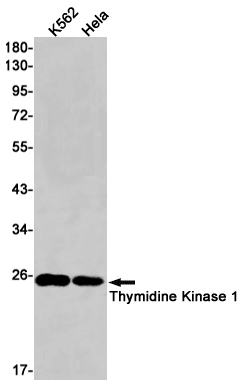
| WB | 1/500-1/1000 | Human,Mouse,Rat |
| IF | 1/20 | Human,Mouse,Rat |
| IHC | 咨询技术 | Human,Mouse,Rat |
| ICC | 技术咨询 | Human,Mouse,Rat |
| FCM | 咨询技术 | Human,Mouse,Rat |
| Elisa | 咨询技术 | Human,Mouse,Rat |
| Aliases | EC 2.7.1.21; KITH; TK-1; TK1; Thymidine kinase 1; cytosolic |
| Entrez GeneID | 7083 |
| WB Predicted band size | Calculated MW: 25 kDa; Observed MW: 25 kDa |
| Host/Isotype | Rabbit IgG |
| Antibody Type | Primary antibody |
| Storage | Store at 4°C short term. Aliquot and store at -20°C long term. Avoid freeze/thaw cycles. |
| Species Reactivity | Human |
| Immunogen | A synthetic peptide of human Thymidine Kinase 1 |
| Formulation | Purified antibody in TBS with 0.05% sodium azide,0.05%BSA and 50% glycerol. |
+ +
以下是关于Thymidine Kinase(TK)抗体的3篇参考文献示例及其摘要概括:
---
1. **文献名称**: *"Development and Validation of a Novel Anti-Thymidine Kinase 1 Antibody for Cancer Diagnostics"*
**作者**: Jagarlamudi KK, et al.
**摘要**: 研究开发了一种高特异性抗TK1单克隆抗体,用于检测血清中TK1水平,评估其在多种癌症(如乳腺癌、结直肠癌)早期诊断中的敏感性和特异性,结果显示其作为非侵入性肿瘤标志物的潜力。
---
2. **文献名称**: *"Mitochondrial Thymidine Kinase 2 (TK2) Antibody as a Biomarker for Mitochondrial DNA Depletion Syndromes"*
**作者**: Wang L, et al.
**摘要**: 通过制备抗TK2多克隆抗体,分析了线粒体DNA缺失综合征患者细胞中TK2的表达变化,证实抗体可用于组织样本的免疫组化检测,辅助遗传性代谢疾病的诊断。
---
3. **文献名称**: *"Antibody-Based Detection of Viral Thymidine Kinase Activity in Herpes Simplex Virus Infection"*
**作者**: Griffiths DA, et al.
**摘要**: 研究利用抗病毒TK抗体(如HSV-TK)建立酶活性检测法,监测疱疹病毒感染期间TK的表达动态,为抗病毒药物疗效评估提供实验依据。
---
4. **文献名称**: *"Thymidine Kinase 1-Specific Antibodies in Cell Cycle Analysis: Implications for Proliferation Monitoring"*
**作者**: Karaçali S, et al.
**摘要**: 通过免疫荧光技术结合抗TK1抗体,定量分析细胞周期不同阶段TK1的定位与表达水平,证明其在评估细胞增殖状态及肿瘤治疗反应中的应用价值。
---
以上文献方向涵盖癌症诊断、遗传病研究、抗病毒治疗及细胞周期分析,反映了TK抗体在基础研究与临床中的多样化应用。如需具体文献,建议通过PubMed/Google Scholar以关键词检索。
Thymidine kinase (TK) is a key enzyme involved in DNA synthesis, catalyzing the phosphorylation of thymidine to thymidine monophosphate in the salvage pathway. Two isoforms exist: TK1. a cytosolic enzyme expressed during the cell cycle’s S-phase, and TK2. a mitochondrial isoform involved in mitochondrial DNA maintenance. TK1 levels rise during cellular proliferation, making it a biomarker for rapidly dividing cells, such as in cancers or viral infections.
Antibodies targeting thymidine kinase are valuable tools in research and diagnostics. Anti-TK antibodies enable the detection and quantification of TK1 in tissues or bodily fluids (e.g., serum) via techniques like ELISA, Western blot, or immunohistochemistry. Elevated serum TK1 activity, detected using these antibodies, correlates with malignancies (e.g., lymphomas, solid tumors) and viral infections (e.g., EBV, HSV), aiding in disease monitoring or prognosis. In virology, anti-TK antibodies help study herpesviruses, which encode viral TKs critical for nucleoside analog drug activation (e.g., acyclovir).
These antibodies also distinguish between TK isoforms or phosphorylation states, supporting studies on cell cycle regulation, mitochondrial disorders, or drug resistance. Commercially available TK antibodies are often validated for specificity across species, facilitating translational research. However, cross-reactivity or variability in TK expression levels requires careful experimental controls. Overall, thymidine kinase antibodies bridge basic research and clinical applications, offering insights into cellular proliferation dynamics and therapeutic targeting.
×